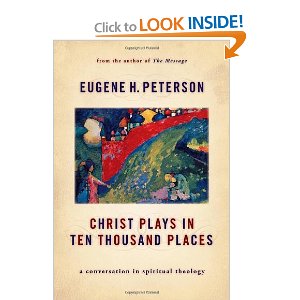At the moment, my bedside table is stacked high with books.
Novels and Memoirs: Deep Creek by Dana Hand, Let the Great World Spin by Colum
McCann, Reading Jesus: A Writer’s Encounter with the Gospels, by Mary Gordon…
Poetry: Sinners Welcome, by Mary Karr, Otherwise by Jane Kenyon, Theology and
Ethics: Neither Beast nor God: The Diginity of the Human Person, by Gilbert
Meilander, Theology of the Body by Pope John Paul II (the “in simple language”
edition!), Family Ethics: Practices for Christians, by Julie Hanlon Rubio, Accompany
Them With Singing: The Christian Funeral, by Thomas Long… Disability: Inventing
the Feeble Mind: A History of Mental Retardation in the United States by James
Trent… It’s a rich and exciting list, but I’m just starting to wade in. I hope
I’ll get to share with you my thoughts on this stack before too long.

For now, a quick reflection from Christ Plays in Ten
Thousand Places, by Eugene Peterson. I haven’t come close to finishing it. But
every time I pick it up, it leaves me with thoughts to chew on for many days to
come. Last week, he had me musing about the self vs. the soul. This week, he’s had me thinking
about the “fear of the Lord.”
It’s a phrase that comes up in the Bible, and particularly
in the Old Testament, over and over again. I read a Psalm last summer that
said, “The Lord confides in those who fear him” (Psalm 25:14). It puzzled me.
I’ve always heard that “fear of the Lord” means reverence or respect for God,
not trembling-in-my-boots, but that Psalm suggested a special kind of intimacy
related to this mysterious fear. I filed it away and it popped up in my brain
again when I read Peterson’s explanation of the phrase: “It is the stock
biblical phrase for the way of life that is lived responsively and
appropriately before who God is, who he is as Father, Son and Holy Spirit.” Peterson
goes on to explain that in Hebrew, this words actually constitute a “bound
phrase”: “Its function as a single word cannot be understood by taking it apart
and then adding up the meanings of the parts… Fear-of-the-Lord designates a way
of living that cannot be dissected into two parts, any more than a baby can be
dissected into what comes from sperm and what comes from egg.”
I’m still not sure why this concept includes “fear.” But I
know that this isn’t a “get it together or something bad is going to happen” kind
of fear. I think it must be a posture of submission, of trusting God with my
whole life, even when it doesn’t seem to be working out, even when God seems
absent, even in the midst of suffering. It’s a posture that leads to intimacy: “The
Lord confides in those who fear him.”


